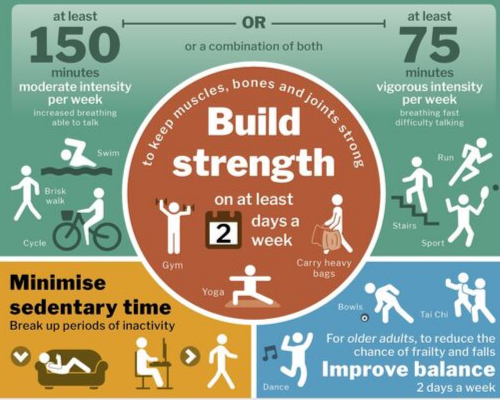If we use it, we won’t lose it, and if we have lost it, we can get it back.
We’re talking about muscle strength and good balance, which, if lost, can affect our ability to stay happy, healthy and independent in later life.
As we age, we naturally lose muscle strength. If we don’t stay active in older age, this can lead to falls, we can lose the confidence to go out and we could lose connections to our friends, community and nature, and eventually losing our independence altogether.
As well as this personal social and wellbeing impact, the total cost to our health and social care system is huge and has been estimated at £470million a year, or almost £1.3million a day.
But the great news is that it’s never too late to start improving your strength and balance. By taking part in activities that build muscle and improve our balance, we can stay active and independent for longer. And falls do not have to be an inevitable part of ageing.
This is why we welcome the new Chief Medical Officers’ guidelines and especially the new infographic for adults and older adults that puts building strength at the heart of its message on physical activity for good health.

The guidelines state that adults should do activities to develop or maintain muscle strength at least twice a week. Adults over 65 should also take part in activity that improves balance and coordination twice each week.
I hope that this will help bring the importance of strength and balance to the fore. I would say awareness about strength and balance is pretty low at the moment, a view supported by published research on The Forgotten Guidelines by The University of Edinburgh’s Physical Activity for Health Research Centre.
Currently only 29% of adults in Scotland meet both the muscle strengthening and the moderate/vigorous intensity physical activity (MVPA) guidelines and adherence to them drops significantly with age, just when we need it the most.
With 19% of Scots now aged over 65, it is crucial that we raise awareness of the importance of meeting all of the physical activity guidelines for all adults and that health and social care professionals are resourced to raise the issue of physical activity at every contact with patients and service users.
Paths for All support over 670 weekly safe and sociable Health Walks all over Scotland, aimed at inactive adults and those managing long term conditions. By supporting thousands of people every year to become more active, we have a tremendous opportunity to promote the importance of strength and balance too.
All our Walk Leaders are trained on the Chief Medical Officers’ physical activity guidelines and on how to promote strength and balance to walkers.
Many are trying out our programme of exercises on Health Walks and encouraging people to continue them at home and incorporate them into everyday life.
By providing training and resources to our Walk Leaders and to health and social care professionals, Paths for All want to promote the message that leading active lives and improving strength and balance is everyone’s business.
To find out more about the training and support we can offer, click here.
Scotland's Chief Medical Officer, Dr Catherine Calderwood, recently endorsed Paths for All's Health Walks. Watch our video.


